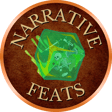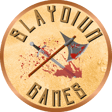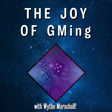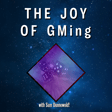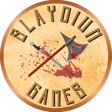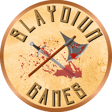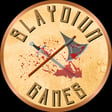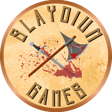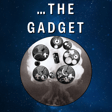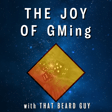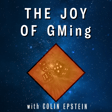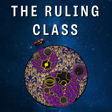Introduction to the Joy of GMing
00:00:35
Speaker
Whether you're at a game table, in your comfiest chair reading a book, or listening at home, there's nothing like a great adventure story. But they don't happen by accident. Welcome to the joy of GMing, a special interview series on the craft of great gaming. There's just something magic about sitting down to a good table with great friends, isn't there?
00:00:56
Speaker
If you're a lifelong gamer or a newbie rolling up your first character sheet, if you're a DM or a GM or just can't get enough tabletop talk in your day, this is the show for you.
00:01:08
Speaker
Each episode will bring you amazing guest speakers to talk about writing games and running them, building fantastic worlds and compelling story arcs, and oh so useful tricks of the trade. Here's some amazing stories, get inspired for your next game, and join us for an hour and a half or so of lively conversation.
Background of Hosts and Guests
00:01:28
Speaker
This sister series to Anywhere But Now, our Doctor Who actual play podcast, will be released between mods or episodes with our ongoing serialized show. We cover some making of and behind the scenes tidbits of our latest mod as well, so do stick around.
00:01:45
Speaker
I'm Casey Jones. Over the last dozen years, I've written and produced screenplays, children's animation for TV and film, graphic novels, stage plays, murder mysteries, and audio adventures. I've also been writing and running tabletop games for over 10 years. Join me as we dive deep into tabletop with experts in the field. Experts like our special guest today, Emily or M for short, Friedman. Hello. Hello.
00:02:14
Speaker
M. Friedman is an associate professor of English at Auburn University. An 18th century specialist, digital humanist, and book historian by training, her current work focuses on the long history of creativity outside commercial mass media, from never published manuscript fiction of the 18th and 19th centuries to creator cultures of the 21st, and we'd love to hear more about that.
00:02:39
Speaker
She is generally considered one of the senior scholars and leading experts in the study of actual play, the performance of role-playing games for wider audiences. Em, thank you so much for joining us today. Glad to be here. That's probably the best read of my bio that's come around in quite some time. Oh, well, I'm flattered. So what drew you to actual play in the first place and what sparked an interest?
00:03:07
Speaker
Yeah, so my longer work is a kind of fascination with the ways that people have always told stories, not
00:03:21
Speaker
for money, not for mass audiences, not for mass attention. So from about 2009, when I came across the first entirely handwritten manuscript novel,
00:03:37
Speaker
that I encountered at Schottenhaus Library in Britain that was from 1799 to today. I've been very interested in kind of hunting all over the world for other examples of these things that were written for maybe one person, maybe written for a small
Historical Storytelling and its Evolution
00:03:57
Speaker
group. We have some evidence that some of them literally traveled around.
00:04:01
Speaker
There's a beautiful one at the New York Public Library that was issued in 18 months of serialized Dickensian form circulation, lavish illustrations. You can go read it online at the New York Public Library's website. It's called Ruben Rattle, The Younger Sun. We might be able to put links in the show notes. We can do that, too. We do. It's thousands of pages of fun. And at the very end, the author explains
00:04:30
Speaker
that he wrote it for his friends and family to circulate that this was not intended for publication. And indeed, many of these things will explicitly say, this is for your eyes alone or this is a gift. And sometimes the stories are interesting and sometimes they're not, but I'm fascinated by the idea that it blows up the story that we tell about technology, which is that once print technology takes center stage
00:04:57
Speaker
in the 18th century and becomes more available and increasingly less expensive, that the old form of circulation, which was literally copying things by hand and moving them around with your friends, died out. It wasn't relevant.
00:05:14
Speaker
And then you see all of these examples in late 18th and the 19th and even into the 20th century. And then you look and you realize, oh, right, it's not just these weird little examples. It's the history of Russian samizdat and copied stories that were circulating outside of commercial print because they were illegal. Right. There's lots of reasons why people will choose forms that are outside of
00:05:42
Speaker
the kind of mass media commercial capital, right? And so it was a kind of organic process of I was writing the book that will probably take me another 10 years because it's a very large project, the prehistory of fan fiction, that's about these manuscripts and putting them into the kind of longer history of people writing outside.
00:06:04
Speaker
of commercial print and I realized that I wanted to write for public audiences which meant that I was going to start experimenting with writing about this to different fields in academia but also beyond and that gave me the vocabulary that one of the things that I ended up doing in about 2018 was since I was writing all these articles about all these different things
00:06:28
Speaker
exercising different muscles, I wrote about a show I'd been watching for a while, Critical Role, because there was a call for papers. And that exploded and my subsequent courses have exploded. But I came to actual play because it was a form I became very fascinated by when the kind of dawn of fifth edition meant that we had an explosion of interest in
00:06:55
Speaker
not just recording the old version of actual play. The oldest version of what we mean when we say actual play in tabletop is the literal recording of gameplay for design purposes, for observation, for kind of working out the kinks, but not for necessarily entertainment.
00:07:16
Speaker
But it is a practice that's existed offline for quite some time, for a very long time.
Impact of Critical Role and Actual Play
00:07:22
Speaker
And it came over in bits and pieces as YouTube and Twitch start to rise. And before that, we can see it on some of those other video platforms that predate them.
00:07:35
Speaker
And I was really kind of interested originally as, oh, this is a way for me to kind of see tabletop stuff happening in the same way that board game reviews like shut up and sit down and things like that are also fun to kind of decide what you want to buy your sister for Christmas sort of deal. And I got back into the hobby after a long hiatus through that work.
00:07:58
Speaker
And when I, in 2018, wrote this Critical Role piece, I thought it was a one-off. And it was published in about 2020. It was adopted immediately by my colleague Adrian Herman at the University of Bonn in Germany that summer. And it became clear to me, oh, if he is teaching my article, maybe I could teach my article.
00:08:21
Speaker
My dear colleague and devoted Dr. Who fan, Craig Bertollet, said, hey, maybe you could teach a class on games and storytelling. And we were coming back from remote teaching, which meant that I wanted to make sure that students felt comfortable not coming to class when they're not feeling well, when they need to rest. So I started recording recaps on YouTube, which you can still see in all their historic awkwardness.
00:08:47
Speaker
And I don't think my students ever watched them, but teachers certainly did. And I became part of a really rich community of people studying what we call analog games. Some people who are educators, some people who are scholar educators, some people who are designers and practitioners. And it's kind of exploded ever since. I now write for Polygon. I now do other kinds of work in this space.
00:09:11
Speaker
Yeah, the origin really was, oh, what are these folks doing? This is something new. This is a new genre coming into being. A new medium. Making its own rules, a new medium, a new set of practices that's clearly drawing from older styles, right? It's deeply informed by improv. It's clearly deeply informed by practices.
00:09:36
Speaker
from voice over. It's clearly being enriched by things like interactive theater, like Sleep No More and stuff like that. But it's also deeply connected to the streaming ecology, as well as the rise of podcasts. And those two different versions of it look just a little bit different, although sometimes they cross over in different ways. And I realized as a scholar of the 18th century novel,
00:10:03
Speaker
I know when I see a new genre coming into being and that doesn't happen very often. And when that happens as a scholar and you look around, you go, wait, is anybody? No. Well, there are people. I'm just the oldest.
00:10:20
Speaker
Quite literally, for this very brief window of time, Matthew Mercer and I are the same age. So I am the same age as many of the kind of leading practitioners of the form or the best known. My students are the prime demographic for the audience. It's a beautiful setup for teaching in that kind of way. But also, it means that I have the security of a tenured job at a research institution.
00:10:48
Speaker
do what I want. And this opportunity was a really striking one to kind of take something that I've been watching and listening to since the late 2000s, early 2010s, make that knowledge
00:11:04
Speaker
and a lot of free time and a lot of laundry time to broaden my knowledge so that I've got a pretty wide base for referencing when we talk about this weird, weird form that lots of me people consume for lots of different reasons. Yeah, absolutely.
Pandemic and Actual Play's Rise
00:11:20
Speaker
And I'm sure that both your classes and our listeners appreciate the time, the effort, and the focus you've put into building all of this expertise. For myself, I remember distinctly one of the main reasons I got into listening to actual plays didn't really happen until the pandemic started. And because before that, I was in the habit of running a game here at home
00:11:48
Speaker
maybe once, twice a month or over Zoom or something like that.
00:11:53
Speaker
And once the pandemic struck and it became very clear that people were not gonna be congregating together in person again anytime soon, I listened to a lot more actual plays for the experience of being around people with good chemistry, people that were friends with each other. And I could almost get the sense of being a friend at that table.
00:12:19
Speaker
And there is definitely a sense of community in that, but it's also a wonderful springboard from which you can say, well, I want to do things like that. I want to find and build my own community of people to tell these kinds of stories with this kind of intimate setting, but for a larger, wider,
00:12:41
Speaker
audience. I really enjoyed your paper. Is it Thursday yet? Narrative time and a livestream tabletop RPG? Because we do our research here. Aw, thank you. You're very welcome. I would love to hear your perspective on narrative time and the different storytelling levels that go into something as simple as just a tabletop game, let alone a tabletop game that is being streamed or recorded and edited for public consumption.
00:13:11
Speaker
because I think some of our audiences may understand on a base level that it is a game, but it is also a show. A story is being shared and unrolling one beat at a time for our audiences. I would love for you to share your perspective on narrative time with our audiences.
00:13:33
Speaker
I think what it boils down to, like we know this intuitively, right? Brendan Lee Mulligan of Dimension 20 has famously said that he is keenly aware that Dimension 20 is filming two shows at once. A story being told collectively and a reality television show where you're watching people play a game, that those are two different pleasures that are happening simultaneously when you watch Dimension 20 and many actual plays.
00:14:02
Speaker
What narratologists and I build on the work of Jennifer Grueling Snyder, who wrote the book before actual play even existed about narrative levels and tabletop, because the important thing for us to all remember is that performance isn't something that we add on to tabletop to make actual play.
00:14:23
Speaker
It's something that happens when you're playing, right? You're not necessarily imagining an audience, but you have an audience of your fellow players. And in fact, every time I've talked to folks who are casting and figuring out tables at, you know, stuff like Roll20 or D&D, you know, when Blizzard is sponsoring things like that, when they're bringing together a group
00:14:50
Speaker
They're bringing together a group where a good player is a good audience member. It's not about, are they going to make a big story moment? It's when the story moments happen, are they going to be good for the audience to kind of come into the space with us? Which is why, of course, someone like Abriya Iyengar is like the kind of superstar of this space because she's very reactive. She will kind of have a face that telegraphs.
00:15:20
Speaker
when it calls for that and then lock into a character when that's necessary. And so that kind of interesting tension, you know, strategic breaking is an important part of this form. At least I find.
00:15:35
Speaker
So grueling Snyder talks about the kind of different levels of narrative within just when we play tabletop games. So there's the story, the dungeon master or the DM or the storyteller, right? Like the facilitator is telling. There's the players who are responding with different storytelling elements.
00:15:58
Speaker
They're responding in character. They're asking questions out of character. And they're also using dice. Everybody's using dice at a mechanical level to tell the story. Yes! To tell the story. And so all of those components come into the way that the story is structured, right? There's the element of chance, which is the beautiful thing about actual play to my mind. And then there's the interaction of the different people at the table.
00:16:26
Speaker
Once we get into actual play, we talk about the narrative levels or the narrative frames expanding.
Audience Interaction and Parasocial Relationships
00:16:32
Speaker
Robin Hope, who famously wrote one of the first, if probably the first, master's thesis on critical role, she argues there's a fan frame.
00:16:43
Speaker
which she thinks is both the audience can participate in, but also she very complexly, and I'm still grappling with how I feel about it, talks about the people at the table as being fans of each other. And then an audience frame. And there's no question that there's an audience frame, and there can be audience mechanics that then come in too, right? Different shows, especially early on,
00:17:10
Speaker
when they were using Twitch in particular, used monetized donations and other ways of having fans kind of
00:17:18
Speaker
come in and be able to change parts of the narrative. This is also very common with charity streams. Exactly. You raise a lot of money from having chaos happen. Well, one of my favorite examples of exactly that, I recently watched on YouTube a recorded post already mixed in everything charity game where donors could
00:17:41
Speaker
If they donated a certain amount, like it was $100 to gift someone a natural 20 or $200 to strike one of the GM's natural 20s if they ever rolled one. So very much in the Hunger Games spirit of things, you could sponsor your players, make things easier for them or harder for them. And just as like you're talking about,
00:18:04
Speaker
the audience level of the narrative directly nudges the roles of the story they're perceiving.
00:18:13
Speaker
Right. My friends, I've done a couple of charity games and my friends are lovely human beings and I love them very much and they have disposable income. And so they are exactly the kind of people who will donate for different kinds of effects, which at one point led to me not this wasn't what they donated for, but it was they donated for a wild magic effect, which the DM decided was a self fireball. So, you know, yeah, I have feelings.
00:18:40
Speaker
And some shows, I mean, most famously critical role in that time where this was being experimented with most heavily, shows explicitly to step away from that element of audience interaction. Audiences have never been able to impact what happens when you watch, for example, Critical Role. And of course, pre-recording, proliferating,
00:19:07
Speaker
means that audience participation is less key to the form in those ways or comes in in different sorts of ways. Podcasts, famously The Adventure Zone but also Dungeons and Daddies and other shows have robust discords where at a certain level of donation you get certain kinds of access that mean you can
00:19:31
Speaker
you know, submit weird magic items or NPC names or those sorts of things, which are also a way that the audience can impact, but in a way that's kind of kept at a somewhat safe remove, can be deployed strategically, isn't blaring in the face of a player at a like a self-fireball to the noggin.
00:19:56
Speaker
These are all experiments because no one knows why an actual play takes off, aside from what we've already talked about, which is the parasocial. The feeling that you're watching, not only people who are friends with each other, but who
00:20:12
Speaker
feel like you have a certain kind of intimacy, even though you intellectually, most people intellectually do know, right? These are not my friends. I am not watching people I personally know, but you do have this feeling and especially for the very long actual plays,
00:20:29
Speaker
especially for the actual plays I think that have either really robust talkback spaces or discords or other kinds of high touch moments or you know have just high visibility in other kinds of ways and
00:20:46
Speaker
Having spent the weekend, I was not at Gen Con. I chose to punish myself in other kinds of ways. I put out a call a few weeks ago as Twitter is dying. I put out a call I've put out many several times before, which is
00:21:02
Speaker
asking people to pitch me their actual play. And I commit to watching or listening to at least a half an hour from whatever time mark the person gives me. The only rule is you have to give me a specific episode. You can't just say, oh, pick whatever. No, no. 89 people, actually hundreds of people have made this. 89 people submitted to the NEs in the podcast category this year. Oh, wow.
00:21:28
Speaker
Yeah. I get hundreds of these kinds of recommendations when I put out a call on Twitter, which is great, but it also means like there's no, I can't, you know, go search for your show, which may have a show title very similar to several others, and then pick an episode. Because usually if you, dear listener, are a person who might want me to listen or watch your actual play,
00:21:57
Speaker
I'm really glad and that's exciting to me. But I can almost guarantee you that the first episode and the first 30 minutes are not going to be you at your best. Fair. Yeah, you're introducing characters, your audio quality probably isn't as strong as it's going to be. I mean, there's a reason why people say don't listen to the first 26 episodes of Critical Role. Sure. Skip ahead to the next arc.
00:22:24
Speaker
People ask me how I taxonomize actual plays, and I really don't do it by budget. And I don't do it by, you know, how fancy or even like, are you LA, Atlanta? The key thing for me is, do you care enough about what you've made to have listened to it and to have a kind of awareness of where you're most strong for the audience? Because I think everybody who does actual play knows how the experience of recording it made them feel.
00:22:54
Speaker
but a much smaller number of creators are aware of how it feels as an audience member to experience that same, unless they are also the editor of their work or the producer, which is why I love backstage labor so much. I had a student, Olivia Price, work with me all last year on backstage labor.
00:23:19
Speaker
inspired by our friend Kristen Essin's work on backstage labor in Broadway. And thinking about, you know, this is the invisible labor. This is the labor of art. This is the labor that's least likely that we are not talking about in terms of compensated labor.
Behind the Scenes of Actual Play Production
00:23:35
Speaker
It's often people doing multiple jobs all at once. A lot of hats on.
00:23:39
Speaker
Yeah, and it's enormously creative, generative, and it's always fascinating people to talk to. Some of my favorite thinkers in the space are the folks who, you know, are doing what I know, like the work I can't do, right?
00:23:55
Speaker
y'all my youtube channel i mean go subscribe i there will be better content made by people who actually have production sense in the coming in the coming weeks months and years uh but me with iMovie is a sad sad thing uh don't even get me started on trying like someone who's like do you want to start a podcast it's like the world does not need another like person like me you know struggling with audacity i think
00:24:22
Speaker
That is entirely fair. Audacity can provide its headaches from time to time. Which is to say I have great respect and appreciation for the fact that for what every recorded hour of content on an edited actual play, you're talking about hours and hours and hours of labor after the fact. Oh yes, absolutely. To really make it shine.
00:24:45
Speaker
I scarcely know where to begin because you've talked about so many wonderful things. But if I were going to start with the invisible work, my first and foremost creative background was in theater from middle school onward was involved in theatrical projects at school got my bachelor's degree in theater and served my time as a techie.
00:25:08
Speaker
you know, in all black and quietly making sure that the props and the set pieces were ready to go and being exactly where it had to be because it needs to run as a well-oiled machine. And the sign of work well done is work you don't notice. Yep. My background in the quote unquote trenches has given me the appreciation for the behind the scenes mechanics that need to happen either
00:25:36
Speaker
Before, during, or in post-production, if the narrator has a certain vision of what they want it to look like, what they want it to sound like, the impact of the story they're trying to tell, there are hours of work that go into it.
00:25:51
Speaker
on the topic of the right half hour to listen to. And this goes to our listeners as well, because having looked at our playthroughs and whatnot, it's clear that more of our Joy of GMing episodes have gotten listens than our actual story that we're telling with Anywhere But Now. So for you, Em, as well as our listeners, if I had to say, start here, if you're not gonna start at the very beginning, start with the wages of joy.
00:26:19
Speaker
It is our third story, so it's episodes five and six, because I'm a sucker for cliffhangers. I absolutely adore the, you know, as the music stings, just as the Daleks roll around the corner, or the plant leaps out of the pot to kill you, et cetera. And with the good team, and they're gasping, and then they're laughing with relief because they don't have to face them until next week, or an hour from now, or things like that, start with The Waiters of Joy. It's about a theme park planet,
00:26:48
Speaker
uh it kicks off right away and all of our players our time lord and their two companions have already met and have already started traveling together the first companion joins in the first two episodes the second companion joins in the second two-parter and by wages of joy the we've had our game zero these players have played together a handful of times and the chemistry is there the syncopation of like
00:27:14
Speaker
working with each other and talking with each other and they just jump right into the fun.
Doctor Who's Influence on Narrative Structures
00:27:20
Speaker
And I think that Wages of Joy is one of the... We try to make an episode of Doctor Who or a story that feels like Doctor Who. Big Finish has been one of my favorite listening joys for the last several years and what they can do with talented actors from the original classic series and new sound effects and music that is composed by the same people from the classic series
00:27:45
Speaker
They've brought on producers and directors from the classic series to come back and work on Philip Hinchcliffe was one of them who was a big producer for the fourth doctor Tom Baker and After he left the BBC He came back to big finish a decade or more later to produce more gothic horror stories with with
00:28:07
Speaker
the fourth doctor, Tom Baker, just because, you know, it was an opportunity to do so. And he loved that vibe. For us, we want to jump in. You land the TARDIS with a bit of a hard landing. You make sure that everybody's dusted up and their finest duds. And you go out and you have fun. And you explore. And you poke things. You poke them. You poke them with a stick. You poke them with questions. And you just play.
00:28:32
Speaker
That's the pitch. That's the whole pitch for Wages of Joy. Things are not what they seem, but, you know, it's a tabletop game. Things are never what they seem. Yeah, and I think what's really fascinating is that Doctor Who is such a good case study that we could think about when we think about where actual play can go. Doctor Who is huge. Massive. Right? It's older than all of us on the call.
00:28:56
Speaker
If you needed to be a completionist, you could not be, right? There's so much that's lost of classic who. And so you have to, as you are kind of thinking about how does one consume Doctor Who, there's lots of different ways in. Each doctor, of course, provides a new way in in that kind of way.
00:29:22
Speaker
but also each episode is still episodic, right? You can hop in, I mean, the Christmas episodes are the best example of this, but you could hop into any episode of Doctor Who and you're not gonna get everything, but you're gonna get something, you're gonna get something that's satisfying and you're going to maybe wanna watch more.
00:29:42
Speaker
And that's a beautiful thing. And that's one of the things that's remarkably hard to pull off with the way that actual play is currently constituted for the vast majority of folks. Because it ends up being single narratives that stretch on for so long that we are starting to be like,
00:30:04
Speaker
The only frame of reference in terms of duration for some of the longest actual plays is soap operas. So many of us are nerds that consumed the really big doorstop kinds of fantasy novels because fantasy is such the kind of beating heart of the form, although many of us are trying to kind of move in a more timey-wimey direction in all kinds of ways.
00:30:27
Speaker
ways. And that's one of those things. I mean, I remember when I first taught the class, the lovely Abriya Iyengar asked if she could come to class and we were talking, well we talked for a really long time, we talked, I think before class even got started,
00:30:45
Speaker
And I asked, you know, where do you think actual play is going in the next couple of years? Because she's part of so much of it. And this was right after the summer of Abrilla, a summer that has not stopped a mere in 2023. And she said that things are gonna get shorter. And I, and she was right. So many things are now edited. There are lots more mini series, Dungeons and Dragons, like the owners of Dungeons and Dragons, Wizards of the Coast has really pulled back from it.
00:31:12
Speaker
very long form in-house or sponsored productions like the Black Dice Society and Rivals of Waterdeep and instead in kind of invested in celebrity one shots or miniseries. Chaosium has thrown a bunch of money into really beautiful but very short
00:31:33
Speaker
Call of Cthulhu productions done in studio that are basically almost larp in terms of costumes and embodied NPCs and all kinds of interesting things. What's interesting, of course, is that she's right and she's wrong, right? What does she end up owning the means of production for this year?
00:31:53
Speaker
that's all her own and Brennan Mulligan's and Erika Ishii and the Wilson. It's world beyond number, which is basically them saying, we're going to do a long form D&D campaign, the style of critical role rather than the style of dimension 20.
00:32:08
Speaker
Now, they're on a release schedule that's humane and they are shorter episodes and they are batch recorded the way that Dimension 20 similarly is. They get together for a week and they record a whole mess of content that's going to get released for months and months thereafter so that they can be together all in one place. But in terms of the audience experience, it's a long form way of being intimate
00:32:37
Speaker
with this collective. So it's interesting, right? You know, we have this paradox of long is what keeps you invested. Long is what keeps you in the ecosystem, whether you're a hooligan or an actual play person. But you have to have the short, the short is what convinces a new audience member to come in. You have to hook people quickly. And this is also true in the field of tabletop actual play when we think about
00:33:07
Speaker
apologies to everyone in the audience. This is now the Dr. Friedman puts her hat on and this is the citations of French theory little portion. So Brendan Keogh, an Australian researcher in video games and indie video games, just wrote a brilliant book called The Video Game Industry Does Not Exist.
00:33:27
Speaker
And in it, he uses the notion derived from French theorist Bordeaux about the field. And a field of cultural production, dear friends, ladies, gents, and friends beyond the binary, is all the people, right? Not just the people, say, in a video game world. It's not just the people who are making a living, making call of duty.
00:33:51
Speaker
It's everybody who's making all kinds of games, and some of those people are doing it as part of other kinds of media work, and some people are doing it in addition to a day job, and some people are students, and some people want nothing to do with selling this stuff for money. This is also true in tabletop. This is also true in actual play.
00:34:11
Speaker
A field of cultural production makes new terms by which to judge and value work outside of capital and outside of popularity by doing things like making awards and other ways that the field can recognize quality, whatever that means, right?
00:34:32
Speaker
And so when we talk about the emerging field of actual play and how awards work, the Ennies ask that you submit 15 minutes. WebFests generally ask
00:34:46
Speaker
for a 30 minute submission. And then if you are invited to participate in the WebFest, they will also ask for a seven minute cut so they can screen that. And then a 90 second cut for social media. And this is a really interesting thought exercise in these massive stories that we're telling. What is the part that will convince an audience that what you're telling is a story that is worth
00:35:16
Speaker
engaging in for the long haul with a decision time of what feels like the blink of an eye. And man, if I knew the answer, it's rough. But I've seen some really, as a judge for New Jersey Web Fest, I've seen people rise to that challenge and do really beautiful things. I saw a beautiful edit of a four hour live stream of Bluebeard's Bride called Gdaya.
00:35:42
Speaker
And they edited that sucker down to tell another story, to tell the compact version of that story, to show off what they did across those four hours in 30 minutes. Beautiful work. And sometimes people have submitted a 30 minute stretch.
00:35:58
Speaker
of material that tells you everything you need to know about the vibe of this show and what it sounds like. Sometimes if it's a video thing, what it looks like, it can be done. I promise. As someone who has consumed a lot of half hour bits, I can tell you a lot about a show from a half an hour. Absolutely. There was a whole portion of your paper isn't Thursday yet.
00:36:22
Speaker
on the art and practice of absorbing and digesting just the summaries of how to assimilate 500 hours of content, which I thought was really interesting. From my own experience, like as a writer in a number of genres and also as the person after we're done recording who has to trim out all the ums, uhs, and waiting for someone to type up the role because they don't use physical dice, they use digital.
00:36:51
Speaker
And that's not a complaint. That's just like a fact of like, okay, we want this to be engaging and entertaining, so we're going to trim out as much of the fact of silence and ums and uhs as we can. But then there's the art of the previously on.
00:37:07
Speaker
where you have to encapsulate 90 minutes of polished material trimmed down into what can we tell and sum up in five minutes or less of the part one that our listeners should have contextually before they jump into part two. So here's my question. The half hour that is submitted for some of these awards is it 30 consecutive minutes? Is it 30 of the best minutes patched together?
00:37:35
Speaker
It's whatever the collective wishes to submit. They can submit a full episode, I should note. Again, Dr. Friedman does not recommend this practice. Because in 2021, the first time I taught the tabletop class, I had students do analysis of the first 20 minutes of as many actual plays as possible. And one of the things that became very clear very quickly was, oh, no.
00:38:05
Speaker
There's almost no play content for many shows in the first 20 minutes. Wow. That's a surprise to me. Even if in a live stream that's been recorded, you scroll up and the holding, holding, the necessary, we're getting online soon, minutes.
00:38:27
Speaker
Even so, there's a lot of housekeeping. And again, this is not a question of, oh, some people are professional and some people are not. Critical Role is a bog standard 20 minutes every time at the top of the show. It does not vary, and then they get into play. So this is very, very common. So if you're feeling really like you're just throwing spaghetti at the wall, people will submit an episode and you'll listen to the first half hour and I'll get 10 minutes of your gameplay.
00:38:55
Speaker
You know, I won't get your, you know, they send the files that, you know, they're not sending a link, so it's not, you know, embedded ads or anything like that. But unless they're actually hard recorded into the file. But no, I've seen sizzle reels, right, of here's a collection of clips. I've seen one sustained scene from in the middle of things. Sometimes the DM will kind of record an introduction that says,
00:39:20
Speaker
This is the setup of this scene just so you know and here's what kind of actual play we are. There's a lot of different strategies. I think Kill Every Monster showed off clips from three different ones of their episodes and like did the little like, here's what we did in this. Here's the setup of this episode. Here's an example of our gameplay.
00:39:40
Speaker
And they're a shorter, you know, they are kind of very episodic so they can pull that off. But yeah, so there's lots of ways to skin the cat in these kinds of ways. And people are, we're all still learning, right? These are the very early days of evaluating the form, right? The NE doesn't yet distinguish between video and audio. Talk show and actual play. It's all just podcasts.
00:40:07
Speaker
Wow. Yeah, that's a mess. I've been talking a lot to Ned Donovan at New Jersey Web Fest, where I am a judge, and with Jeff Stormer, who is organizing the actual play for Minnesota Web Fest. And they in turn are kind of influencing a lot of the adoption of actual play categories into other web fests.
00:40:28
Speaker
trying to think through, okay, so what are we learning from these early attempts at categories, what categories need to emerge, what categories need different ways of judging, right? The hard part about a sizzle reel sort of situation is
00:40:47
Speaker
if you've got a category like best editing, then what editing are you talking about, right? What editing is, right? It's the old tech labor is invisible labor, right? If you do it right, you barely notice. Things feel organic, even though you've cut out a whole bunch of mess. And how do you actually evaluate that as a technical achievement without seeing the raw material?
00:41:16
Speaker
If I knew I would make recommendations, but for now all I can say is this seems to be, I'm the one in academia as in everywhere else I am. Part of me is like, does this seem like a problem to anybody else? Can we fix this or are we just stuck with this? Well, I think there are a lot of different things that we can keep in mind creatively so that our finished product, however it's going to be judged, measured, weighed,
00:41:45
Speaker
can be the best that it possibly can. And I think part of that starts with what do we as the creator want out of it? What do we expect out of it? And like you said, Doctor Who has been around for so long. There's so much material to draw from.
00:42:06
Speaker
Not just in terms of characters and narrative and so forth, but also tonally. What have we come to expect from an hour or a half hour from Doctor Who? Because in classic Who it was half an hour long and then 45 minutes and now it's a solid hour again. And I think as creators, if we can, if we're sitting down to put a game together, whether it's our first one or our dozenth. Is that a word? Dozenth?
00:42:32
Speaker
It is now. Words are words when we use them. That is the answer of these things. That is beautifully put. Words are words when we use them. But for me, Doctor Who means a story about someone with hope and optimism and eccentricity who may not be the easiest to connect with but will still try to connect anyway.
00:42:53
Speaker
Facing challenges and people and situations where violence or a hard shove may seem like the most sensible answer, but turns out not to be because compassion and cleverness and resourcefulness, things that are available to us beyond just how much we can bench press,
00:43:14
Speaker
are the bread and butter of Doctor Who. None of them have ever done like a big brawny flex of, you know, the Schwarzenegger, oops, this shirt is too tight and my biceps are too big. Why don't we have Himbo, Doctor Who? This is a problem. I'm like, come on. I don't know, we might be getting it with the new Doctor, just a little bit. We might. Fingers crossed. Well, the Himbo is such an interesting archetype.
00:43:42
Speaker
Also true. Because there was an article I saw on IO 9 earlier today, or possibly AV Club. They're both owned by Gizmodo. Right. About the archetypal hymbos that paved the way for Ken as the iconic 2023 hymbo. True.
00:44:01
Speaker
But no, historically, historically, companions are the ones that are because Doctor Who is indeed kind of brains, right? You can't, it would take a very large transformation to make Doctor Who no thoughts had empty. Yeah. That's, yeah. Yeah.
00:44:19
Speaker
The most recent Kimbo on the ship was probably the companion Dan, who lasted most of, if I think just a little over a season with 13 Jodie Whitaker. He did not strike me as particularly bright as a companion, relying more on his walk pan to deal with problems and so forth. I don't know where I was going with that, just... That'll happen. That'll happen.
00:44:47
Speaker
But it is interesting the ways in which it's going to be interesting to see how those kinds of pop culture archetypes kind of trickle over into this spongy space that is actual play, right? Like people take up the kinds of stories that they're really excited about from other parts of the culture and they get transmuted into this form.
00:45:10
Speaker
because really what people are trying to do and this you know be it be it anywhere but now be it um any number of spaces that one of the appeals of of actual play for the performers i think as well as for the audience is that kind of
00:45:27
Speaker
immersive world building that becomes possible, that feeling of moving around in a kind of fully realized space, what tabletop is always trying to kind of simulate in
00:45:43
Speaker
in these long-form versions, right?
Tabletop Storytelling and Immersion
00:45:46
Speaker
Tabletop role-playing games are much, much broader and more diverse than what can be performed. Some games do not lend themselves to a form of performance that is anything other than perhaps a how to play or a very brief encounter.
00:46:06
Speaker
that spurs you to play the game itself, which is why I loved what James D'Amato has built with One Shot and what Jeff Stormer has built with Party of One, because those are projects that are designed to show you the game as played more in spirit of, and you should go play that game. Maybe you can go play that game. Maybe you'll find that fun.
00:46:30
Speaker
And there's other projects that they've done that do other kinds of things, but at the heart, that's what that form of actual play is doing that I think is necessary and needed. But when we're talking about wanting to live in a world that we feel like is real, we have different kinds of
00:46:50
Speaker
constraints on mechanics. For example, what I love about Friends at the Table is the way in which I can watch different systems be used to make a world and be played through it. However, there's a certain amount of, because you see the sausage being made and you know everything is contingent in those kinds of ways,
00:47:12
Speaker
Every, all of these shows break the fourth wall, but this is, you know, almost to the point of dissection, so that, at least for me, and of course all of these things are deeply personal, it is not as immersive in those kinds of ways. It's engaging, it's deeply engaging, but it's not immersive, which is different.
00:47:30
Speaker
There's been a lot talked about whether the magic circle is real and whether you can ever really access a kind of bubble in the playing of a role-playing game. But I do think that it's really interesting that actual play is simultaneously a form we are more likely to consume while doing other things.
00:47:51
Speaker
but also is most popular and most widely consumed when it is offering a 360-degree feel of a world in many cases. I couldn't agree more. My current ranking favorite actual play to digest is Dimension 20.
00:48:13
Speaker
not the least of which because of the amazing mini work and table art that leaps to life with three dimensions because of the talented artists and painters and crafters and designers they have.
00:48:28
Speaker
that work tirelessly to thematically make consistent everything visual about the show, from the color of the dome, the geodesic dome behind the players, to the music, the musical cues and the occasional sound effects that they pepper in. And yes, it is something that I will either, you know, watch without distraction
00:48:52
Speaker
or listen to while I am playing a game or going for a walk or doing the dishes, things like that. But immersion, creative immersion, as in with the imagination, could not be more important, as far as I'm concerned, to effective storytelling. Using descriptive language to paint a picture, not only for your eyeballs of
00:49:17
Speaker
walking down the corridor towards the dark at the other end of the hall but also the smells that hit your nostrils of the sweat
00:49:24
Speaker
that has dripped off the workmen too petrified to get closer and the air that gets colder and colder as you get closer but you have no idea why because outside it is the middle of July. And by taking those extra moments to inform the listener's mind of this is what we're seeing, this is what we're feeling, this is the anticipation we're building and then to add on top of that
00:49:48
Speaker
We're talking about texture with music. We use the library provided by Tabletop Audio. He is linked and referenced in every single one of our doobly doos because Tabletop Audio, run by a man named Tim, has composed hundreds of these 10-minute pieces, these compositions, for different beats of a story, for different environments, with or without sound in the background of the ogre gently snoring.
00:50:17
Speaker
or the troops that are strapping on armor as they get ready to march out. But that level of attention of, okay, things are getting riskier now as we grab the lever on the TARDIS console to try and get the hell out of here in time, so the music
00:50:34
Speaker
gets louder and the adventurousness the urgency of like oh no we're going to get there in time we have to roll there's the second layer of the storytelling we've been talking about past the narration where the chance is involved and the characters creation the characters are helping those beats move along
00:50:53
Speaker
I have found it satisfying, not only my own enjoyment of like, oh, that felt really good, or that felt like an episode of Doctor Who, but the enjoyment of our players, because they are the barometer, they are the ones who, if they're having fun, it's working. If they're not having a good time, something is wrong.
00:51:14
Speaker
And it's super interesting, especially when we think about sound. Because one of the things that's really striking when we think about Dimension 20 is, with the exception of the season where Dimension 20 was performed live, and that was Fantasy High sophomore year.
00:51:30
Speaker
which they have not returned to that format. We'll put it that way. The audience hears the audio cues. Audience sees the illustrations. The players don't. And you contrast that to something like Critical Role, where the audio is all dynamic and live and is being experienced as a additional cue from the DM because it's not happening off stage. It's being controlled by Mercer, who has a set of stream decks.
00:51:59
Speaker
And now he has lighting cues because of course, when we are talking about these very, the most highest profile of these studio actual plays, they are literally all watching and taking notes, right?
Innovations and Challenges in Actual Play Production
00:52:12
Speaker
Critical Role's new studio is partly its own innovations, partly looking to the dome. The dome is doing some interesting stuff with projections now, which seems involved in the kind of,
00:52:26
Speaker
conversation. I think it comes from their own kind of ideas, but also it seems not inappropriate to mention the work of Hyper RPG, which is a much smaller. Their actual play has a fraction of the audience, which was Kolok, but they have all kinds of ties to those other studios and then some because they're kind of a leader in live
00:52:56
Speaker
live streaming technology and they have done really ambitious stuff.
00:53:01
Speaker
with live visuals in particular and camera work and interesting cinematography. The most recent season of Kolok moved between the legacy cast led by Abriya Iyengar and the kind of new cast which included Danielle Radford among others. And the legacy cast is trapped in their own minds and they are also trapped in television kind of almost squared off.
00:53:30
Speaker
aspect ratio. Meanwhile, the young kids who are wandering over all of the former United States of America are in widescreen format. And so literally in the middle of this in the middle of the episode after the break, you watch the aspect ratio transform to remind you that we're in a we're in a very different place in different space, even though these are all still people sitting at a table. It's a it's a plush. It's got, you know, projections behind them.
00:54:01
Speaker
you know, but not representational, but using the language of cinematography to be part of the storytelling in really interesting kinds of ways. And I think that that's
00:54:15
Speaker
Some of that is because they have very expensive equipment that they use for other purposes and this is their calling card. This is the thing where they show off and they get to do a cool story. But some of the other things that we've been talking about in terms of
00:54:31
Speaker
you know, thinking like an editor, thinking like, thinking in terms of layering, things and thinking in those kinds of ways cost time more than anything else. And time is not nothing, but it is more widely available than other things. As long as, and I'm hoping that the pre-recording batch recording trend facilitates this, as long as we are able to move to a place where people have a humane
00:55:00
Speaker
schedule. Oh yes. I think one of the challenges is there are so many in what in the book that I'm writing on actual play I have taken to calling the ambitious middle which is to say like the folks who want to be part of web fest who want recognition who are actively seeking sponsorships and funding who are able to you know they have for them success is being sustainable
00:55:28
Speaker
Not necessarily, no one, no one rational thinks they're going to be critical role. But building a sustainable kind of troop of folks and an audience willing to support them, you know, I think is a more reasonable goal. It absolutely is.
00:55:44
Speaker
And the folks in that kind of level space, headspace, are often also professionals with training in different kinds of ways and have different reasons and different ways in which this is part of the portfolio of their creative lives, if not their creative, professional lives.
00:56:04
Speaker
But there's choices that get made in terms of, you know, are you going to do podcasts versus a kind of video? Video has that sense of intimacy. If you are live streaming and you're already a live streamer, it makes sense that this is part of a portfolio of live streaming content.
00:56:22
Speaker
But does that grow your audience? I don't know. No, it allows your audience to continue to watch you do things, right? Which is the desperate, the need that content creators who are streaming creators, you know, Twitch has minimums for how much you need to stream every month in order to qualify for different kinds of levels of compensation and things like that, as well as just there's an audience expectation that you'd be online.
00:56:52
Speaker
And those are all pressures that change the format relative to the podcast. What's interesting, right, is that so many of those become podcasts. And then you see the podcast space have this really wide variety of different kinds of productions because the way they were originally crafted was so very different with different kinds of labor investments at different parts of the process.
00:57:21
Speaker
I find that fascinating, especially because we're going at it backwards. I was originally content for us just to be a audio adventure that people could listen to and go on with their day and just know that there was something polished that sounded halfway decent and felt like it was mine.
00:57:44
Speaker
And that's a completely valid and extremely common reason people create. Absolutely. You want to feel like you're contributing something, that you are a part of the field, as it were, of what you determine makes a good story. A marketing friend of ours has recently convinced us to reach out and find a video engineer.
00:58:15
Speaker
so we can start streaming in addition to recording for a podcast that will still be trimmed down of the ums, uhs, and silences and things so that it can be polished and packaged as its own hour and a half or so of serialized content that has nothing to do with the interview series, which is, for reasons that don't entirely escape my understanding, is more popular than the show itself.
00:58:44
Speaker
I mean, as someone who is more caught up with not another D&D podcast's dungeon court than I am with their main campaign, I mean, the handy thing, right, is that it's a one-off, right? And you're capturing a different audience, a broader audience in these kinds of ways.
00:59:01
Speaker
And I think that's also common is that we see three black halflings does the same thing, that they move back and forth in the same feed of their kind of interview or discussion of issues of the day kind of content, and then their actual play performance content. And so I think that it's not
00:59:29
Speaker
I think it's a pretty wide practice, especially when you think about these as kind of
00:59:35
Speaker
portfolio or variety kinds of, if what's being, if what the attraction is, is come into a community, right? There's different ways into the community. There's some folks who are gonna be here for a long form narrative or narrative at all. And there are others who are gonna be present and interested in the thinking through of ideas or those sorts of things.
01:00:02
Speaker
which I think is a very, very interesting to kind of consider about, you know, how does how does something grow? I mean, one of the things that I always say as a thing that is obvious to many people, but not to everyone, is that no one makes their living off of actual play.
Economics and Motivation in Actual Play Creation
01:00:22
Speaker
Not a single one. No one. It's no one's
01:00:26
Speaker
full-time solo job you know when you talk about and it's even more true when you talk about the people who are at the kind of quote unquote highest budget highest level critical role has to have an amount of multiple subsidiary companies right so you can walk through the door that is their actual play but increasingly you don't have to go through that door
01:00:50
Speaker
to come into the world that they have created of both stories and ideas and games and yada yada yada. And in so too, I think it's appropriate that Dimension 20 is the crown jewel of dropout and college humor, but it is one part of this
01:01:14
Speaker
the house that, under Sam Reich, improv has built, right? And there's long-form narrative storytelling, but if that's not your bag, you can watch a bunch of musical theater nerds, you know, improv a whole, like, musical in half an hour, or you can watch a bunch of nerdy-ass game shows, some of which are some of the best things.
01:01:39
Speaker
Robbed of Emmy nomination, just robbed. Emmy for Game Changer next year. Game Changer is one of my favorite shows on Dropout TV. It is as much the joy on the host's face every single show, just making Brennan Lee Mulligan suffer.
01:01:59
Speaker
The first episode I showed my friend who was the now past head of the theater department here was indeed the episode where Brennan cannot be right. And one of his students had said to him that he reminded them of Brennan Lee Mulligan. And so it was particularly acute to watch this fellow pale freckle ginger man with a beard suffer.
01:02:31
Speaker
So he had an immediate parasociality moment, which is really quite entertaining. That's phenomenal. So Em, you have studied, you have judged, you have critiqued hundreds of different actual play shows. So from your vast, and we do mean vast personal experience. Too many. Don't try this at home. Most people only keep up with four.
01:02:57
Speaker
Who has time for all of these? I still have to ask, what do you personally think makes for a great actual play? Well, here's what I will say. Here's what hundreds of shows and I think at this point, maybe tens of thousands of hours of consuming this stuff is. I don't want to count, and I don't think that is healthy. To be fair, it's been over a decade, right? Like, just let's all caveat here.
01:03:24
Speaker
What I've realized is that I can say what makes for a good and compelling actual play to me. Please do. And that's about as much as I can say. Now, there are some very baseline things like that anybody can tell you, which is you want to have your audio on point. But at the end of the day, every story of an audience encounter with an actual play is a love story.
01:03:55
Speaker
I can no more describe the perfect imaginary partner than I could, or why I love the people that I love, than I could imagine distilling it down.
01:04:13
Speaker
If we were talking about commercial liability, we might be able to have some conversations, but I also don't think that's a useful thing. I think what you have to figure out is, what do you want when you're making this thing? How do you want people to feel? And how do you want to labor? How much labor do you have?
01:04:37
Speaker
And like how much labor do you have to give? And who are you playing with? And all of those sorts of things. And I think that we can have a conversation about things that, you know, if your goal is to create an immersive experience as opposed to like a comedic experience, then we can talk about things that potentially break immersion, right? Like if you're not trying to do a comedy podcast, then maybe don't start 20 minutes of
01:05:04
Speaker
the call having the giggles. That said, I've seen B. Dave crack jokes at the start of Black Dice Society, a unquestioningly horrific kind of show. Now, I think that the distinction is there's the moment where he locks in. And I think that's also a critical role thing, like there's the lock in, same thing with Dimension 20 is.
01:05:25
Speaker
you have I think the the best shows know what tone that they're trying to set and you know there might be a release valve and I think these valves are very useful even in serious ones. Oh my god. I think
01:05:40
Speaker
I think it's extraordinarily useful to remember that this is an inherently kind of silly medium, which doesn't mean it has to be comedic, but that you're fighting, and I didn't realize this until I watched this summer, I watched some actual plays with a research group in Bonn Germany, some of whom were familiar with the form before and some not, but I didn't realize that, oh right, if you're serious for a long stretch of time,
01:06:07
Speaker
then if you don't break, the audience is going to break. There's a safety valve that has to happen. And I think, you know, the Shakespeare can teach you that, right? You know, Shakespeare's tragedies always have some element of comedy, some of them more than others, and some of them to the point where, you know, I got yelled at in high school for saying Romeo and Juliet is failed comedy, but I stand by that actually.
01:06:30
Speaker
I mean, that is certainly accurate. F*** them kids. F*** them kids. Romeo and Juliet, the story of hormone-addled teenagers making their first worst mistakes. No one cares about Juliet. Bless. Indeed. Or if we go to Titus, right? That was my first favorite. Easily safe, right? That's a great tragedy. There's also inherent humor in pies. Even people pies are funny. But yeah, so I think that
01:06:56
Speaker
There's a lot that other forms can teach us about what makes something successful. And I think the reason why, you know, the folks who are at the quote unquote top of the game, I mean, part of it is technological and we could go on for another hour or more about the unique confluence of where Twitch was in, you know, at the dawn of Critical Role that facilitated that and any number of other things.
01:07:26
Speaker
lots of other complicated issues, but one of the things that you notice in some of the
Diversity and Inclusivity in Actual Play
01:07:32
Speaker
best folks leading games at any kind of price point, so to speak, is that somewhere in their youth or childhood, they learned about story in some kind of way.
01:07:50
Speaker
for Brennan Lee Mulligan, it's running LARP camps for kids for most of his life, right? For Matthew Mercer, it's, you know, the hard scrabble streets of the friendly local game stores. For Bria Iyengar, it's partly coming from a background where she was a tutor for many years, so there's a very pedagogical aspect.
01:08:12
Speaker
to her work. And so somewhere along the way you learn how to tell stories either in this medium or in some other medium and you understand and have kind of internalized along with your whoever you're playing with how stories work.
01:08:30
Speaker
and that that's part of your practice in some kind of way. And it looks different depending on different methods, but that I think is something that is shared. If all you know, if
01:08:48
Speaker
If all you know is kind of the standard wish fulfillment of either the wish fulfillment that is inherent in some tabletop systems or the wish fulfillment of wanting to perform and be seen, then that's going to be what primarily comes out in performance. And that's not as exciting to watch as
01:09:13
Speaker
either a story being crafted well or characters reacting to a world being put forward by somebody or those sorts of things. So, you know, there's lots of pathways and the downside is I'm working with an undergraduate researcher right now named Carson and Carson said to me recently she realized that
01:09:39
Speaker
you can't like, oh, right, you can't do the same thing as anybody else because that niche is already filled. And if we come back to that notion of the field of cultural production, because Dr. Friedman's not gonna let that go, the way that the field transforms as people come in it, every person in the field is trying to find their own place and the field warps and shifts as people kind of nail down these different positionalities.
01:10:07
Speaker
And it's always about finding a position that's unique or distinct in some way, shape, or form. You can't be the next critical role. Please, please do not send me an email telling me about your... No, no. No, no. It's not next critical role, but the kind of...
01:10:26
Speaker
The things that will not convince me outside of other stimuli to be really excited about your actual play, because I often am asking people, what's new and exciting about your actual play? Because something can be well done and be a duplicate. But what I'm really interested in is what's moving the form forward.
01:10:46
Speaker
And so I get a lot of, well, we're really friends. And I was like, yeah, everyone else says that too. Congratulations, right? Like, I'm glad you have friends. I'm glad you guys made a thing together. That's not the selling point. That's not speaking to its quality. Right? Or yeah, or we're a group of improv comedians. Like, yep, that niche very much filled. Or we're new to the game. Yes. And so we're a lot of people for a very long time. You know, and
01:11:14
Speaker
But on that same, you know, not to kind of rain on anybody's parade because, of course, there's always the way that you're wrong, which is to say, if you look at the concept of Dungeons and Drag Queens, which is the latest Dimension 20 season until Wednesday, you would say, oh, well, Drag Queens have been playing D&D live for a really long time. But these four haven't done it before. They haven't done it together.
01:11:41
Speaker
Now, have highly trained, camera-ready RuPaul's Dragwaste winners and or beloved non-winners ever sat at a table with Brennan Lee Mulligan and all of the production apparatus that is Rick Perry and his team?
01:12:00
Speaker
No, but it's not, but at that point then it's not the concept, it's the execution. It's these queens and this well, particularly well trained DM who is specifically trained to work with new, we don't see him work with new players very often, but he's spent a lifetime doing it. Now, but if you're leaning on your concept of,
01:12:27
Speaker
you know, we are just a bunch of friends or, you know, even at this point, I mean, I will never tell a group of queer folks or BIPOC folks not to make things. We need more of it. God bless them. God bless every production that gets made because we have so very few. I'm glad to see that Transplaner is on the rise in these spaces doing really interesting things both with D&D and beyond.
01:12:56
Speaker
That said, having a queer cast is also a thing that you should signal to get your audience, but is not going to be the thing that makes you unique at this point. Anywhere but now has LGBTQ representatives in our cast, myself included,
01:13:15
Speaker
But then that becomes the other problem, right? With invisible multiple marginalization, how many of those are you going to actually use to sell yourself? Because that's kind of icky sticky, right? And that's a bummer.
01:13:31
Speaker
What we do, but one of the, but to answer your question, like one of the things that not only about new who since Russell T Davies started it up with Christopher, Christopher Eccleston, but the LGBTQ inclusion, there were homosexuals in space. There were married couples of the same gender and so forth. And they were just considered parts of the, using the word field again,
01:13:57
Speaker
part of the terrain. We're going to make them happen. We're going to make it happen. It was just inclusive. They was like, oh yeah, no, that's fine. You know, they're not being, they're not being persecuted. They're not, they're not being shoved out of an airlock or anything like that. And it was not the point of the show. It was not the point of the story. It was just by its very nature, more inclusive. And we have gone out of our way.
01:14:19
Speaker
to make sure that there are LGBTQ characters in the mix of the NPCs they run into, in the backstory of our PCs, and some of them are not from the 21st century. Because, you know, we want to- Because we've always been here, yes. Thank you, thank you. I'm an 18th centuryist, I am legally required to say.
01:14:45
Speaker
Black folks have been in Britain since Hadrian's Wall was being erected and probably before that and my own period has heavily documented examples of people we would call genderqueer or trans or and certainly in terms of kind of
01:15:05
Speaker
same-sex loving, what was then called female husbands, among other things. Yeah, so, yeah, no. And it's also worth, you know, when we talk about the audience and who's creating actual plays, it is worth noting that generationally, as the audience gets younger, it moves to, by the time you get to Generation Z, you get to an equal division
01:15:33
Speaker
Mask, Fem, and NB audience. Millennial, it's slightly majority non-SIS men. I did not ask survey questions about race, so I can't give that pieces of data.
01:15:49
Speaker
But what's interesting, right, is like when I started watching actual play and listening to actual play, it was all white dudes, all of it, like all white dudes, all the time. And hell, hey, I think there was a woman that walked by. And then when I did my research, I realized that because of the bad behavior, because people of course get removed from TTRBG history, at least in terms of the stories we tell each other,
01:16:18
Speaker
that we want the names that we want to remember as opposed to the names that somebody like me has to remember because there has to be a historical record even of terrible people but it means that we've erased the fact that you know one of the first actual plays that we can think of or two of the actual plays that we can think of
01:16:37
Speaker
had all femme casts. Dungeon Majesty, which was a kind of public access show in LA, and it's been forgotten mostly because it hardly exists anymore because it was a public access show on.
01:16:53
Speaker
local TV. Alex Chalk has written about this for analog game studies journal. But the other one I hit it with my axe has been forgotten because or has been not talked about because people do not want to talk about the DM who I will not name because he is a remarkably litigious person who is in active lawsuits with several several people but notably and made the press quite a lot in the very early days of
01:17:19
Speaker
actual play and this is the late 2000s folks for being all folks involved who are sex workers and that was like the titillating thing and which is a reminder that you know the forefront of any technology the forefront of any cultural movement is often queer folks and
01:17:38
Speaker
marginalized folks, including people who in the West are performing sex work. And all of those folks who we should give flowers to for being innovators often get forgotten in favor of the white dudes who make things far more popular. And that's a no offense to white presenting people on the call.
01:18:06
Speaker
It's my own cross to bear that I pass for a cis white straight guy. No, this is the challenge, right? And this is the challenge that faces particularly those flagship shows that did not start out diverse and that depending on their
01:18:29
Speaker
organizational structure, its critical role is owned by its cast. So they can kind of open the door to even long-term guests, but their ownership structure precludes, I think, the possibility of having a full-time new cast member of any kind.
01:18:54
Speaker
they can have new shows that have new casts and Candela Obscura seems to be one of the leading among them. And I think that that's part of the reason why their casts are often people who have other jobs for whom this is their extra fun thing. And Dimension 20 has always been the intrepid heroes have always been reasonably diverse. They have
01:19:19
Speaker
a non-binary core player, like a black core player and a player of Asian descent, but still majority white and those subsequent seasons have tried to change that.
01:19:34
Speaker
But yeah, I mean, the number of high profile people who are making quite a bit of, to the extent that anybody's making money, it's a lot of white folks. And there's been some work, but not enough work to make that less of the case. But we see some really egregious examples of
01:19:57
Speaker
good, solid shows being created that are just as old and just as renowned, not getting the kinds of funding and sustained funding and things like that. And yeah, it's really tricky because all of this is new and all of this, it cannot be stressed enough. There are so many creators in the space at this point, especially those who came in in the 2020 kind of, the last boom was 2020. There was a boom in 2018 as well.
01:20:25
Speaker
And anybody who came in those periods does not always really realize that so much of this form was spaghetti at the wall. It was part of a constellation of other things people were trying on the internet in the wave of
01:20:42
Speaker
the failed pivot to video nonsense that blew up Facebook. And it's also really interesting that we can talk about this form now between the writers' strikes. It comes of age not long after the Writers Guild of America strike resolves in 2008. And it is rapidly transforming, and indeed SAG has to pay attention to this form.
01:21:08
Speaker
Uh, because some shows, not very many, very few in fact, um, are under SAG contracts. And as far as I can tell, almost none of them are under the same SAG contract because SAG doesn't know what to do with actual play. Cause it's, it's not equity because it's recorded and durable, but in every other way it doesn't align with, with SAG at all. Yeah. Is a mass. It's a fun math for me until it becomes real.
01:21:37
Speaker
It is a fun mess and it can be intimidating with all of these factors, with all of these things that may or may not be perceived as obstacles in your way or reasons not to do it. I think one of the most important takeaways I can leave our audience with
01:21:59
Speaker
Because you mentioned, because you said that a good actual play should be a love story, I would tweak that just the slightest bit to say that a good actual play is a love letter. When I am putting together a game of Doctor Who,
01:22:19
Speaker
I am writing a love letter to a show and a franchise that has seen me through some difficult times. And the best respect I can pay, the greatest thanks I can give to this thing that has brought me so much joy is to spend my own version of it with characters that have not done this a thousand times
Advice for Aspiring Actual Play Creators
01:22:41
Speaker
or across 500 plus episodes through a dozen incarnations or more, but someone who is new, someone who has never done these things before, so that we can capture that freshness of, oh, I'm seeing Mars for the first time, not the 17th. But for our writers out there, for our players out there who want to do this for the first time, write the love letter.
01:23:05
Speaker
make it some focus on the things that you enjoy the most out of your genre. I'm not saying stick with Doctor Who, not necessarily stick with D&D. Whatever game you've discovered that brings you personal joy to be involved with is probably a good place to start, I think. And I think that there's a reason why
01:23:30
Speaker
this form is dominated by folks who are friends or who have a deep love of the medium or of play, because it's not the only thing, but it sure don't hurt as part of the recipe. It sure don't hurt as part of the recipe. I would also encourage our listeners to reach out and ask
01:24:00
Speaker
for help. Don't just assume you just, oh, I don't have what I need, or I don't have the people in my team that I'm looking for. I have played over the years with several different tables and several different combinations of players at tables, and when we set out to put together anywhere but now, we specifically looked for a particular type of player and asked friends of ours, as well as, you know, poking around on Discord, etc.,
01:24:30
Speaker
to find those people because we don't have a budget. We can't pay actors to show up and partake of this. We have to explore and ask and reach out and say, hey, I need help with so-and-so. And that can be scary. That can be intimidating to do. But I would enthusiastically encourage our listeners to take the chance, reach out and say, hey, I think this might be cool to work on. Would you be interested in helping?
01:24:57
Speaker
M, you have been an absolute delight to talk to today.
Conclusion and Audience Engagement
01:25:02
Speaker
How can our listeners get in touch with you? Where can they find you?
01:25:05
Speaker
Well, you know, I used to lead with the fact that on Twitter you can find me at F-R-I-E-D-E, or the word, German word for peace. And I still am there as the site crumbles, as I am on the bluer skies. But I own the means of production at ecfriedmanfriedman.com, as I have for, I realized over half my life now, which is terrifying.
01:25:30
Speaker
You can sign up for a free mailing list where I post, I send out calls only when I've published something or when I need interview subjects for my own scholarship, things that don't go out on podcasts. So for some people that's much, very much more appealing and some people that's not. And as well as surveys, I do surveys that are approved by my institution that
01:25:59
Speaker
They are guaranteed not to cause you psychological harm. And so if you are someone who is listening to actual plays or interested in the TTRPG space, or on the other hat that I wear that we didn't talk as much about today, Jane Austen and the 18th century, then you can find me there. You can also find me on Instagram and YouTube as CriticalProf. Very nice.
01:26:27
Speaker
Yeah, the YouTube channel is going to get hopping. I'm working with Evan Twerrer from the Game Lab at the University of Cincinnati, along with some special secret guests. On a project, there's lots of explainers for how to play the game in short bite-sized kinds of pieces.
01:26:44
Speaker
There's not a lot for how to read actual plays and tabletop games in a kind of scholarly light. So we're working on a video series of really high quality, working with our production group here at Auburn to create small explainers for different big ideas in tabletop. Things like bleed and these narrative levels we were talking about and all these sorts of things. That's fascinating. And you also contribute regularly to Polygon.
01:27:13
Speaker
Yes, under the name M Friedman, you can find me at Polygon. And all of my writing, both academic and non-academic, is linked on my website. And for academic materials, wherever possible, I include a free link for you to download. And if there's something that you can't find a link to, you can always email me. I have contact info on the website as well. Beautiful.
01:27:39
Speaker
and all of that information will be found in our doobly-doo.
01:27:46
Speaker
Listeners, another big thank you for sharing your precious time with us. If you feel it's been well spent, please share the joy of GMing with your friends who are looking to enjoy themselves. You can email your questions for me and our future guests and send that lovely fan art to anywhere but now podcast at gmail.com. And if you'd like me to run a game of Doctor Who or something else for you, reach out on startplaying.games.
01:28:13
Speaker
If you like what you hear, leave a review, rate the show, and follow us on Blue Sky and on Twitter at anywhere but now, and wherever you get your podcasts. Links to everything in the doobly-doo. From all of us, I'm Casey Jones. There are exciting things to come, my friends. I'm glad you're along for the ride. Thank you so much, and have a great day.

